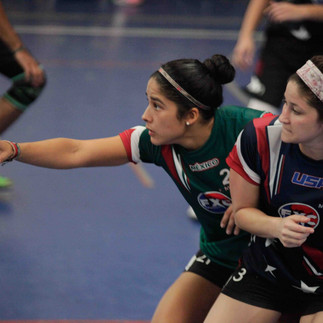CLOSING THE GAP: PROMOTING GENDER EQUALITY IN SPORTS WITH FIREBALL EXTREME CHALLENGE™
- International FXC Federation
- Jul 4, 2023
- 5 min read

Max Bartoli
CEO & Co-Founder
Washington D.C. June 29th, 2023
Gender equality in sports has long been a contentious issue, with women facing numerous barriers and discrimination in the pursuit of athletic excellence. However, a potential solution to this problem is emerging in the form of Fireball Extreme Challenge™ (FXC). This innovative sports platform offers a promising path towards achieving true gender equality in sports, both on and off the court.
A History of Women's Struggle for Sports Equality and Overcoming Male Dominance.
For centuries, women have been denied the opportunity to engage in physical activities due to societal beliefs about their supposed physical weaknesses and the threat their participation posed to traditional gender roles. These prejudices have perpetuated a narrative of male dominance, physical strength, and power, leading to violence against women, exploitation, exclusion, and discrimination. It is high time we put an end to this outdated narrative and create a more inclusive sporting environment.

Jock Semple, center right, tried to hustle Kathrine Switzer, No. 261, off the Boston Marathon course in 1967 - Paul Connell/The Boston Globe, via Getty Images
In recent decades, women have made significant strides in mass and elite sports participation. Efforts by international sport governing bodies, such as the International Olympic Committee and FIFA, have played a role in promoting women's sports. However, it is important to recognize that these organizations may still uphold male hegemony, and their initiatives may be driven by commercial motives rather than a genuine commitment to gender equality.
Studies have shown a positive correlation between gender equality in a country and its participation in international women's sports.
Countries with greater political empowerment for women tend to have a higher representation of women's athletes and a greater number of women's disciplines. This suggests that macro-social gender equality fosters a supportive environment for women's sports and encourages their participation at various levels.
The stark disparity in earnings between genders.
One major obstacle to achieving gender equality in sports is the stark disparity in earnings between male and female athletes. Male athletes in sports like basketball, golf, soccer, baseball, and tennis earn significantly more than their female counterparts. While the argument that women's sports generate less revenue is often used to justify this discrepancy, it fails to address the systemic biases and barriers that hinder women's ability to reach the same earning potential as men. Women are often denied the same opportunities as men to excel in their respective sports, further perpetuating the cycle of inequality.
How we can build a future for true gender equality in sports.
To address these issues and pave the way for true gender equality in sports, several actionable steps can be taken. First, it is crucial to reduce the investment and financing gap in women's sports. Currently, men's teams receive the lion's share of sponsorships and television deals, while women's sports struggle to secure adequate financial support. By increasing funding for women's sports, more opportunities can be created for women to participate and excel.
Another crucial aspect is media exposure. The media plays a significant role in shaping societal attitudes and reinforcing gender stereotypes. Often, women athletes are portrayed primarily as women rather than athletes, perpetuating harmful stereotypes and limiting their recognition and support. Collaborative efforts between organizations and the media can help increase visibility for women in sports and challenge existing inequalities in sports journalism. Moreover, training and recruiting female reporters can contribute to promoting women's sports and addressing gender disparities in sports media coverage.
Language also plays a vital role in shaping gender stereotypes in sports. The use of derogatory phrases and stereotypes can undermine the achievements and abilities of female athletes. A conscious effort should be made to avoid such language and instead celebrate the accomplishments of athletes regardless of their gender. By challenging traditional gender roles and stereotypes, we can create a more inclusive and supportive environment for all athletes.
It is crucial to stop assuming that men are inherently superior athletes. Women have unique strengths and abilities that should be recognized and celebrated. By challenging the notion of male superiority in sports, we can break down the barriers that prevent women from achieving their full potential.
Moreover, the implementation of policies for gender equality is essential. Sports organizations must strive to provide equal opportunities, financial support, and perks for women who put in an equivalent amount of effort as their male counterparts. Successful marketing strategies for female athletes can also contribute to increased revenue and higher-paying salaries, making sports a more attractive and viable career option for women.
Encouraging female-led sports teams and supporting them with the same enthusiasm as men's teams is another crucial step toward achieving gender equality in sports. By attending women's sports events, joining clubs, and actively promoting equal opportunities for all genders, we can create an inclusive sporting culture.
FXC’s Promising Solution
In this pursuit of gender equality in sports, FXC - Fireball Extreme Challenge™ offers a promising solution. This unique team sport allows men and women to compete at the same performance level, providing equal opportunities for all genders and placing a strong emphasis on teamwork and integration. The presence of certified referees split equally between men and women ensures fair judgment and eliminates any potential bias.
In FXC, the traditional focus on individual ambitions takes a back seat to the power of collective achievement. The FXC-point-based system serves as a tool to advance gender equality, as the ranking position of each participating team in any league is determined by the total number of points scored in all matches. This means that team play is prioritized over individual accomplishments, fostering an environment where players must work together to achieve success.
In FXC, the most integrated teams emerge victorious, where players of all genders seamlessly collaborate and play in an integrated manner. This shift in mindset challenges the notion of singling out weaker or underperforming players. Instead, FXC cultivates a culture of teamwork that capitalizes on the diverse strengths of each individual, with the goal of creating a unified and cohesive team.
The European motto "Unity in Diversity" perfectly encapsulates the FXC philosophy. Every player's role and contribution are highly valued, with special emphasis on those who may have faced discrimination based on gender, body type, or sexual or religious orientation. FXC recognizes that diminishing the significance of any player undermines the core principles of equality and unity.
As FXC - Fireball Extreme Challenge™ paves the way for a new era in sports, it seeks to dismantle gender biases, empower athletes of all genders, and redefine the dynamics of teamwork. While professional paid FXC leagues are yet to be established, the International FXC Federation and the International FXC Organization are committed to creating these leagues with a maximum yearly team budget and equal pay for all players, regardless of their gender. Moreover, teams will have the opportunity to share in the media revenues generated by their respective leagues, a vital incentive that further promotes fair competition and reinforces the importance of collective success.
FXC - Fireball Extreme Challenge™ represents a paradigm shift in sports, where gender equality and teamwork are not just ideals but integral components of the game. By embracing diversity, rejecting discrimination, and promoting collaboration, FXC sets the stage for a future where sports truly become a platform for unity and inclusivity. Together, let us champion gender equality in sports and rally behind the spirit of FXC, where the power of teamwork knows no boundaries.
In conclusion, achieving gender equality in sports requires a concerted effort from all stakeholders, including sports organizations, media outlets, sponsors, and individuals. By addressing financial disparities, media representation, language biases, and challenging ingrained assumptions, we can create a sporting environment that values and empowers athletes of all genders. With initiatives like FXC - Fireball Extreme Challenge™, we can move closer to a future where gender equality in sports is no longer a distant dream but a reality.
*****
What is FXC - Fireball Extreme Challenge™? Watch the tutorials below.
FXC Tutorials in english below
*****
Previous articles on FXC:






























